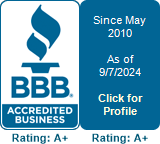Chemical Exposure & Workplace Safety
Although many chemicals are necessary to create products we use every day, they can be extremely dangerous when inhaled, touched, or ingested. Employers and those who work with or around hazardous chemicals must take proper safety precautions to stay safe, but accidents do happen. If you or a loved one has been harmed due to occupational exposure or inadequate chemical workplace safety, our team at Krivitzky, Springer & Feldman can help you file a workers’ compensation claim.
Common Jobs That Require Working With Chemicals
Chemicals can be extremely hazardous if mishandled or used without proper protective gear. These are just a few of the industries in which workers use or come into contact with hazardous chemicals and substances that require extra care:
- Hazmat teams
- Science and medical research
- Refineries
- Construction
- Maintenance
- Trucking
- Mining
- Welding
- Farming
- Automotive
- Aerospace
- Plastics manufacturing and other manufacturing facilities
Injuries Caused By Hazardous Workplace Chemicals
Chemicals found in the workplace can cause a one-time injury, such as burns to the skin and eyes or lung damage from inhalation. Others cause conditions and illnesses that arise due to occupational exposure, which occurs over time. These conditions may include respiratory diseases, breathing problems, cancer, mesothelioma, and even death.
Some common chemicals found in many workplaces include acids, caustic substances, solvents, cleaning products, glues, petroleum products, paint, pesticides, asbestos, and heavy metals. Believe it or not, even photocopier toner can cause health problems if it leaks out or is improperly handled.
How To Keep Yourself Safe At Work
Knowing how to practice proper chemical workplace safety and identify potential problems is vital. Your employer is required to provide proper training in handling these dangerous chemicals. They must also provide warning labels and Safety Data Sheets that detail how toxic substances can present a wide range of health problems. Precautions and protective gear vary, depending on the industry in which you work. Ways to reduce your exposure to dangerous chemicals in the workplace include:
Skin and eye protection: Gloves, aprons, specially made hazmat suits, head coverings, and safety goggles can prevent damage to the eyes and skin. Depending on the materials the protective gear is made of, it can protect your body from liquids, dust, powder, and other chemicals harming your skin.
Using proper tools to handle chemicals: Brushes, ladles, syringes, and other tools can help you apply, mix and measure dangerous chemicals more safely. Your employer should supply all the tools you need to carry out your duties in a safe manner.
Reducing fumes, mists, and dust in the air: Inhalation of toxic substances is a major hazard in some workplaces. Make sure that you use proper ventilation when handling or working with dangerous chemicals. Other ways to reduce harmful substances in the air include covering open containers and chemical baths, soldering and welding at a lower temperature, and controlling the heat and processing times of plastics. Many large machines that involved the production of electronics, shoes, and garments are enclosed in ventilated boxes to minimize the amount of fumes, dust, and mists that are released into the air.
Wearing a respirator: If you must work around dangerous chemicals that are exposed in the air, wear a respirator. The most effective, protective respirators have filters or a separate air supply. It’s critical to make sure your respirator fits properly and the filters and other parts are inspected, cleaned, and changed regularly.
What To Do If You’re Injured By Chemical Exposure
Even if you take proper safety precautions and perform your job with caution, defective equipment, protective gear, chemical spills, and other issues can jeopardize your health. If you’ve been injured or are suffering from an illness caused by occupational exposure, seek medical attention immediately. Report your injury to a supervisor or your HR department right away, if possible.
It’s also important to contact a workers’ compensation attorney to ensure your rights are protected. Your employer’s workers’ compensation insurance should pay your medical bills, a portion of lost wages, and long-term disability payments if your condition leaves you unable to work. If your injuries or illness was caused by a defective or dangerous product that didn’t provide proper warnings, you may be entitled to file a third-party liability lawsuit against the manufacturer. An experienced attorney assesses your case and advises you on the most effective avenues to pursue maximum compensation.
Contact An Attorney Today
If you or a loved one has suffered injury or illness due to chemical exposure in the workplace, our workers’ compensation lawyers are here for you. Call Krivitzky, Springer & Feldman at 201-798-2711 in Jersey City or 973-874-0556 in Newfoundland, New Jersey. You can also get in touch with us online to ask questions or schedule a free consultation. We serve clients all over New Jersey.




